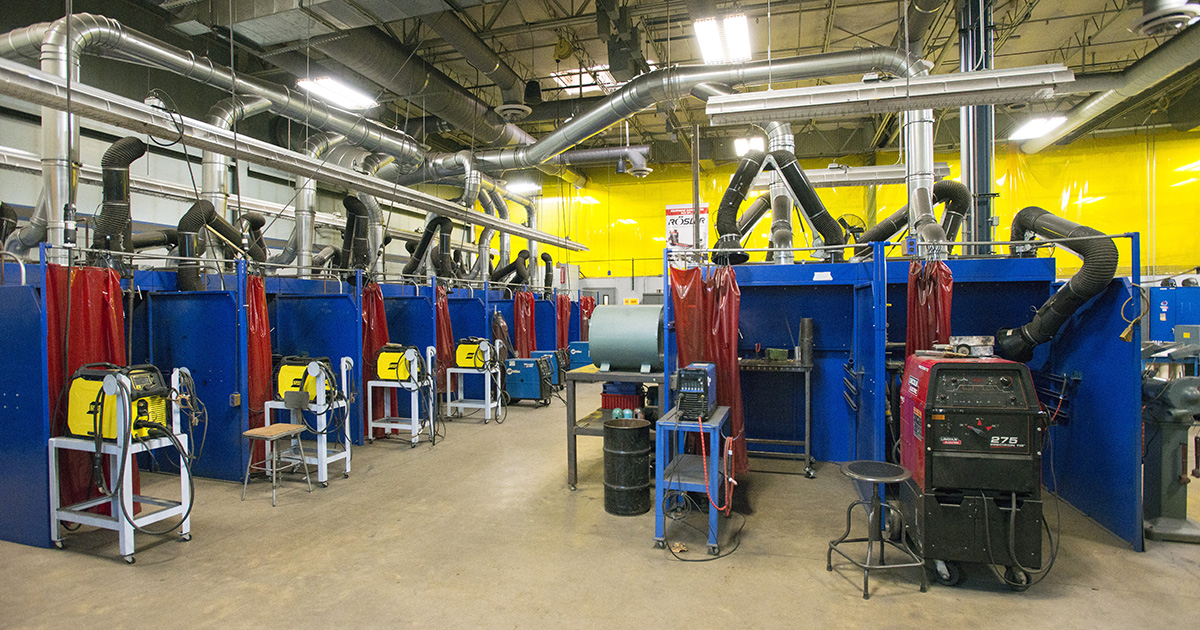
INDUSTRIAL WELDING
Welding is the most common way of permanently joining metal parts. Through welding, heat is applied to metal pieces, melting and fusing them to form a permanent bond. There are a variety of welding processes, including stick, MIG and TIG. The Industrial Welding program at Kellogg Community College prepares students to weld many different metals in various positions using each of these processes.
KCC offers a variety of American Welding Society (AWS) welder qualifications, including shielded metal arc welding (SMAW), gas metal arc welding (GMAW) and gas tungsten arc welding (GTAW). As part of the curriculum, KCC offers students vast amounts of hands-on training time in a state-of-the-art welding lab. As they learn to become expert welders, KCC students can expect to spend less time in the classroom and more time on the training floor mastering welding skills according to AWS standards.
KCC offers a certificate and an associate degree in Industrial Welding, as well as the more generalized Trades certificate and associate degree geared towards company-sponsored students.
- Industrial Welding Certificate (25 credits)
- Associate of Applied Science in Industrial Welding (60 credits)
- Industrial Trades Certificate (25 credits)
- Associate in Applied Science: Skilled Trades (60 credits)
Welding Personal Protective Equipment (PPE)
Due to the risks presented by COVID-19, all students are required to provide their own PPE for use in the welding lab. Students will not be allowed to weld in the lab without this gear.
Contact our welding instructors if unsure about any equipment purchases.
The following items are needed, with an estimated cost of $125 to $150 excluding shoes.
- Safety glasses
- Work boots
- Welding helmet (Lincoln 1740 helmet or similar)
- Welding jacket (green fire-resistant type jacket, not brand specific)
- Welding gloves
- Oxy-fuel face shield (#5, not brand specific)
Course Sequences
Unlike traditional academic courses, the offerings in KCC’s Industrial Welding program consist of short modules that are components of larger units. Modules are often less than one credit apiece and can be completed at a student’s own pace in a matter of hours or days. Units range from 1 to 30 modules, depending on the area of instruction.
Your content goes here. Edit or remove this text inline or in the module Content settings. You can also style every aspect of this content in the module Design settings and even apply custom CSS to this text in the module Advanced settings.
Industrial Welding Course Sequence
| Unit | Title | Credits |
|---|---|---|
| Unit 05 | Basics of Welding | 0.43 |
| Unit 10 | Oxyacetylene Welding | 1.54 |
| Unit 15 | Cutting Processes | 0.79 |
| Unit 20 | Brazing and Soldering | 0.92 |
| Unit 25 | Shielded Metal Arc Welding | 4.02 |
| Unit 30 | Advanced Arc Welding | 5.74 |
| Unit 35 | Welding Metallurgy | 1.27 |
| Unit 40 | Gas Metal Arc Welding | 2.80 |
| Unit 45 | Gas Tungsten Arc Welding | 5.01 |
| Unit 50 | Pipe Welding | 4.37 |
| Unit 55 | Special Applications | 1.68 |
| Full Module Listings | ||
| RMTC | Summer 2024 | Fall 2024 |
| EAC | Fall 2024 | |
| Hastings | Fall 2024 |
Job Outlook & Salary Info
For the latest employment and wage estimates for industrial welding careers in Michigan, visit the U.S. Department of Labor’s Bureau of Labor Statistics website.
Transfer Opportunities
Transfer opportunities are available for students looking to transfer their KCC credits to a four-year institution. Popular transfer destinations for KCC’s Industrial Welding students include Ferris State University, Siena Heights University and Western Michigan University.
For additional advice on transfer opportunities, contact our academic advising department.
Welding Contacts



Brandon McAllister
Instructional Assistant, Industrial Trades, Machining and Welding

